If you tell someone that the average temperature at the end of the century will be, say, 2°C hotter than today, that might not sound too bad.
After all, if today’s maximum temperature is 25°C, and tomorrow’s is 27°C, that’s pretty manageable, right? This experience of day-to-day weather fluctuations might explain why people may not worry too much about rising global temperatures in response to increasing carbon dioxide pollution in the atmosphere.
But if you describe a sleepless night during an insufferable heatwave, and that feeling of being almost drunk with fatigue the next day, someone might better relate their lived experience today with how different the future will be under the new climate regimes of tomorrow.
Communicating climate change forecasts in clinical numbers is one of the reasons people may not fully appreciate the threat to our collective wellbeing as increasing temperatures and extreme weather events become more likely with the world’s climate continuing to shift away from historic trends. This is the thinking behind a new paper that reframes, for the first time, how different West Africa’s climate will be by the close of this century.
How common will extreme weather events be in West Africa under global warming, relative to what we experience today, the researchers behind the study ask?
The paper, published recently in the journal Climate Change by researchers working with AMMA-2050, shows that by the end of the century the average day in West Africa will be well outside of what people experience in today’s climate. This is as the region warms and the monsoon rains are disrupted in response to worsening global atmospheric carbon pollution. The paper visits a number of locations across the region, and gives the likelihood of what a ‘typical’ day will be like at these locations, relative to the present climate.
The researchers’ analysis shows that the maximum and minimum temperatures of a typical day will be greater than the 99.5th percentile of the current range, and that these extremes will be particularly noticeable in the spring and summer months. The monsoon rains will also become less reliable, according to researchers, which will make planting dates for farmers similarly less predictable.
Lead author on the paper, Dr Rory Fitzpatrick from the Institute of Climate and Atmospheric Science at Leeds University in the UK, argues that if climate communication relates projected changes back to what people know and experience in their daily lives and local environments, they might have a more visceral idea of what the future holds and be moved to act with greater urgency. The intention of this novel approach to framing climate modelling projection for the region is to make the scenarios more real for West African policy makers, by making the climate forecasts more relatable, relative to people’s personal experiences.
Novel study zeros in on mental health effects
When someone is badly sleep deprived, their reflexes may be as compromised as if they are intoxicated with alcohol. A person with a sleep-starved brain may experience depression, irritability, clumsiness, forgetfulness, and, in the long-term, even weight gain. People’s sleep patterns are often disrupted during heatwaves, particularly for those who don’t have air conditioning in their homes. This is why the global health community is now starting to think more seriously about the mental health implications of rising global temperatures as a result of increasing carbon dioxide pollution in the atmosphere, and the negative effects of extreme weather events on people’s wellbeing.
Medical research in the psychology sphere has already shown that the distress experienced during heatwaves can result in a number of mental health difficulties: mood instability, insomnia, problematic substance use, and increased rates of violence and suicide. People with pre-existing mental illness may be particularly vulnerable to their condition flaring up again when the discomfort of extreme heat peaks.
The health community is increasingly drawing attention to this aspect of climate impacts. The United Nations Intergovernmental Panel on Climate Change’s Sixth Assessment Report, due out in 2022, will give unprecedented attention to the mental health fallout resulting from the acute stress of surviving extreme weather events (such as post traumatic stress following a devastating wildfire or cyclone), or the chronic distress of living through a lifetime of uncertainty relating to changing weather or collapsing communities. The American Psychological Association has written extensively on this, and the UK Council for Psychotherapy is training members within the psychology profession in this field.
However, Fitzpatrick says that many of these studies have not considered the implications for those living in a developing world context such as West Africa. The study also looks at other health impacts, as well as the consequences for crop and livestock farming.
Download the paper here.
African Monsoon Multidisciplinary Analysis (AMMA-2050) aims to address the challenges of understanding how the monsoon will change in future decades, to 2050, and how this information can be most effectively used to support climate-compatible development in the region.
This article was written by Leonie Joubert as part of a series covering the science produced by various FCFA projects, and introduces some of the people behind it.
—
This post was sponsored by Future Climate for Africa. See our editorial guidelines for what this means.
